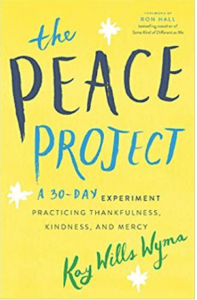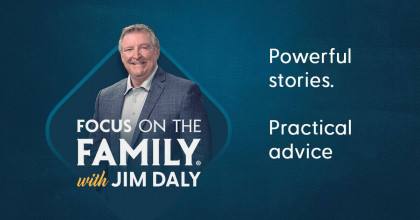Man #1: I feel like peace feels like a really warm blanket on a cold day.
Woman #1: To me God’s peace feels like calm in the middle of a storm.
Man #2: A rock at the beach. The waves aren’t heating it, but the rock doesn’t care.
Woman #2: The peace of God feels like an exhale after holding in my breath for multiple weeks.
John Fuller: Hm, well, what about you? Can you experience a sense of peace and calm in your life? Or does everything feel just a little bit too chaotic? On today’s Focus on the Family with Jim Daly we’ll be exploring how you can pursue peace and other important fruit of the spirit. I’m John Fuller. Thanks for joining us today.
Jim Daly: John, whenever I think of the word peace, I think of our good friend, uh, Ray Vander Laan, who is a Bible teacher and scholar of Jewish history. And one of the great nuggets I’ve gotten from Ray is this concept of God’s Shalom to combat the world’s chaos. Shalom is the Hebrew word for peace, God’s peace, and it describes that deep redemptive peace between us and God, because of the sacrifice Jesus made for us on the cross, and our acceptance of Him as God’s son. That should bring you great peace.
John: Mm-hmm.
Jim: Uh, but it can be difficult to bring God’s peace to others if we aren’t experiencing that for ourselves. And that’s where peace has to start. It has to start within our own hearts. The Book of Psalms has many references to peace where we’re told to actively seek it and pursue it. And our guest today, Kay Wyma, has experienced this very thing. She’s a busy wife and a mom of five, and all the ladies went, “What?”
John: (laughs)
Jim: Um, but she wants to challenge all of us to pursue peace through a special project that she’s developed.
John: Mm-hmm, yeah. And Kay’s a good friend who’s been with us before. Now, today we’ll hear about a book she’s written, uh, called The Peace Project: A 30 Day Experiment Practicing Thankfulness, Kindness, and Mercy. And you can learn more about Kay and this wonderful resources at focusonthefamily.com/broadcast. Here now is how we began the conversation with Kay Wyma on Focus on the Family with Jim Daly.
Jim: Kay, welcome back to Focus.
Kay Wyma: Oh, my goodness. Thanks for having me.
Jim: (laughs) We love, I’m already grinning ear to ear because we love having you on.
Kay: (laughs)
Jim: And your stories are so great ’cause they’re so transparent.
Kay: Well, thanks for the pressure.
Jim: No, yeah.
Kay: Now I have to come up with a good story. I’m just kidding.
Jim: No, I mean-
Kay: (laughs)
Jim: … everybody relates to your stories ’cause they’re the everyday story. It’s what we all-
Kay: Yeah.
Jim: … experience, but you have such a gift of expressing them. Okay, so, starting right out of the gate, your peace experiment started one day when you were pulling out (laughs) of your driveway, and you encountered a big truck driving by. How did that start your peace journey?
Kay: Well, it-
Jim: (laughs)
Kay: … unexpectedly. I mean, I didn’t really think we were on a peace journey until that morning. And-
Jim: (laughs) What happened?
Kay: Okay, so, you know, the morning began slightly unsettled because, well, I had women coming over. I have a meeting, a Bible study meeting every Tuesday at my house. And, um, pooling together for the coffee. I go in the fridge, and there’s cartons of milk, but there’s no milk in the cartons.
Jim: Oh.
Kay: Please say I’m not the only one.
Jim: (laughs)
Kay: Like, am I the only one?
John: (laughs) Been there, done that.
Kay: Oh, my gosh, between-
Jim: I think it just happened to me this morning.
Kay: Seriously?
Jim: Yes. I’m dead serious.
Kay: It’s the worst. It’s like that and the cereal.
Jim: Yeah.
Kay: Like, they’re des- the cereal boxes-
Jim: (laughs)
Kay: … are destined to be empty, but why are they sitting there? I don’t-
Jim: Oh.
Kay: … understand it.
Jim: It’s funny.
Kay: Yeah, so, uh, needless to say, I walked out going, “Well, now I have to race to the grocery store to be able to get the milk,” you know, and I’m like, “Ugh,” and our block, we live on a block where people still have driveways that you use. So you back in and out of it, and there’s lots of cars on our block. And so, already, it was piled. And I look at the end of the street and there’s a truck coming, like a working truck coming my way. And he was so nice. Like, he saw me trying to back out so he pulled to the side, and I start backing out. I get into the street, and lo and behold, this huge black truck is barreling up on me. And I, in my head I’m li-
Jim: From the other side?
Kay: … fro- no, ’cause he, the guy had pulled over. The black truck decided he was pulling over for him.
Jim: He’s gonna pass?
Kay: Yeah.
Jim: Okay.
Kay: So-
John: Oh.
Kay: … he’s like, and, and I’m sort of sitting there going, “This is my street. Like, no,” and, I, happy thoughts are not in my head, and neither are nice words. (laughs)
Jim: (laughs)
Kay: And so this guy’s like face off with the truck and me, and I have no choice but to back up, okay? So, lots of discord, uh, very much no peace in that situation. I start backing up, and I look up, and this unbelievable sky, this sunrise sky, is staring at me. And I breathe. Because looking up has a huge compo- is a big component of peace. It’s getting your eyes off of whatever this is, off of myself, primarily.
John: Mm-hmm.
Kay: And I, I think for a moment, “What am I doing? Like, why am I so grumbly and crabby? Like, I have a Bible study (laughs) coming to my house.” (laughs)
Jim: Yeah, that’s the contrast.
John: (laughs)
Jim: That’s what’s so funny.
Kay: I know it. And so, I start sitting there going, “I am in a car. It is a hot Texas day. I have air conditioning. I’m going into a grocery store, where the milk will be in a cooled, refrigerated cabinet that I can pull out, and probably somebody’s gonna say, ‘Hi, Kay,'”-
John: (laughs)
Kay: … and, and I sort of, like, so instantly, gratitude, again, I have no idea what’s happening here, except that all of a sudden I feel better because that’s what gratitude does. It starts to, like, dial down whatever’s going, and fire up just feelings that are good, which physiologically occur in your brain. You have no idea that it’s happening, but it does.
Jim: I’m laughing about this whole thing-
Kay: (laughs)
Jim: … about, “I gotta get some milk for my Bible study. Get out of my way.”
Jim: (laughs)
Kay: It’s so embarrassing.
Jim: That is so funny.
Kay: But so true.
Jim: (laughs)
Kay: Isn’t that awf- I mean, but whatever, it’s real.
Jim: But then it worked. You realized the benefit of looking up.
Kay: Unbelievable.
Jim: Seeing the, the blessings in your life.
Kay: So, the thankfulness, it actually inspires right in that moment an act of kindness. I had to back up three or four cars and pull to the side ’cause there were that many cars on our street. But instead of, like, [inaudible], you know, I happily did it. I thought, “You know what, I’m moving. There’s this act of kindness that occurred in that moment.” And, um, as the car barreled by, I thought for a moment, “I have no idea what’s going on in that person’s life.” Like, none. They could be racing to the hospital. They could be-
John: Mm-hmm.
Kay: … ha- you know, late for a meeting. They could be a really crabby, terrible person, which wouldn’t be a fun way to live, you know?
Jim: Right.
Kay: And instantly in that moment, I had compassion on that person. And, uh, that was the moment.
Jim: I-
Kay: I drove over to the grocery store and I felt physically great.
Jim: That’s good.
Kay: (laughs)
Jim: Good thing they had milk. (laughs)
Kay: And they did. They did have the-
Jim: It would have been a whole different-
John: Yeah.
Jim: … story.
Kay: I don’t know. You know what’s interesting, Jim? That, honestly, if I’d gone in there and there wasn’t milk, I was on such a high from that tiny, little experience that I’m not sure I wouldn’t have even met it with a who cares.
John: Mm-hmm.
Jim: Well, that’s good.
Kay: I’m, I’m not joking you. It’s, it-
Jim: That’s to the core, then?
Kay: Yes. And it mattered so much, I went in when the ladies arrived, and I told them, because I was sort of like, “You’re not gonna believe what happened this morning. This weird thing happened. I can’t believe how good I feel.” And the next week, one of the ladies said, “Can you tell that story again?” And, um, another lady said, “I did it this week. I did that thing.” ‘Cause I had said to them, “I think the key components were thankfulness and kindness. Like altruistic, I wasn’t gonna get anything out of it. And the compassion part, which it didn’t take long to realize that that’s actually what mercy, that’s one of the components of mercy, which I’m gonna tell you, in this whole story, mercy is, it’s phenomenal.
John: Mm-hmm.
Kay: It’s a killer. And I don’t think we talk about it very much, about practicing it.
Jim: Well, y- y- it’s interesting, and we’re gonna go through those-
Kay: Yeah.
Jim: … uh, three and talk about different stories and different concepts-
Kay: Yeah.
Jim: … there. But I think, uh, sometimes in the society, we think those are soft things.
Kay: Oh-
Jim: You know?
Kay: …man.
Jim: And we, we talk about winning, and we talk about, you know, those other things that are more, uh, warrior-like attitude.
Kay: Right.
Jim: Mercy is-
Kay: Mm-hmm.
Jim: … kinda tender.
Kay: Oh, but let me tell you.
Jim: (laughs)
Kay: I love that you said that, because it actually is a warrior aspect.
John: Mm-hmm.
Kay: All of them are. They’re so, so powerful. And they feed life into s- any situation that has discord, unsettledness, um, frustration. Um, and it brings into the equation humanity. You, actually, through mercy, the most powerful, uh, part about it is that it brings dignity back to the human being.
John: Mm-hmm.
Kay: The one that mercy-
Jim: Yeah.
Kay: … is being given to, as well as the one that is giving it. So powerful.
Jim: Well, and Kay, what’s so good about that in the broader cultural context, you know-
Kay: Mm-hmm.
Jim: … so many people, rightfully, are clamoring for a greater civility-
Kay: Mm-hmm.
Jim: … in everything.
Kay: Yes.
Jim: Going to the store.
Kay: I’m so glad you brought that up.
Jim: Driving down the road. Uh, the economic situation, the political-
Kay: Yeah.
Jim: … situation. We just feel like we’re unhinged now.
Kay: Unhinged.
Jim: And it, uh, we’re not capable of showing each other these attributes-
Kay: Yes.
Jim: … that, and people wrap it in the word civility.
Kay: Right.
Jim: But it is, uh, these things of mercy, that’s part of-
Kay: It’s human-
Jim: … civility is mercy.
Kay: … it’s a humanity issue.
Jim: So, for the person, I’m thinking of the frazzled mom, and-
Kay: Yeah.
Jim: … we have frazzled dads, so I get that, but just the picture of that person, like Kay, who says-
Kay: (laughs)
Jim: … Kay, really.
Kay: (laughs)
Jim: (laughs) Yeah, you like that? Like Kay.
Kay: Yes.
Jim: But that 30-
Kay: I’ll take it.
Jim: … day challenge.
Kay: Yeah.
Jim: You know, the 30 day peace project, really? It, someone’s going-
Kay: Right.
Jim: … I can’t do it for an hour.
Kay: But then-
Jim: How do you expect me to do this for 30 days, Kay?
Kay: Okay, but they’re so easy, and anybody can do them. And, and-
Jim: Okay.
Kay: … here’s the thing. Some days you wo- okay so, thankfulness, kindness, and mercy. It’s like, let’s define what those are. So, when I started it, uh, ’cause, when they said, “Hey, I did it,” I didn’t know it was something to do. And then once I knew it was something to do, I was like, “Let’s try it.” And so, I got my kids onboard, which they are s- why? Why did they say yes?
Jim: Teenagers? How’d you do that? That’s a good question.
Kay: I don’t know. Uh, I think they’re just so tired of me that they’ll be like, “Yes, we’ll do another,”-
Jim: Yes, mom.
Kay: … I know.
Jim: (laughs)
Kay: And, uh, and it was great. So I got a little notebook for them. I had all my friends from that morning wanting to do it too, so we really, actually embarked on it to see if it was something. And we defined it, thankfulness, so 30 days doing these three things. Thankfulness is just, like, one thing to be thankful for, and writing it down.
Jim: Each day?
Kay: Each day. And it-
John: Yeah.
Kay: … and I made the rule with my kids it couldn’t be the same thing. The second thing, kindness, it has to be an altruistic act of kindness, which could be anything. Like, kindness is so simple to do, and the opportunities are everywhere. And what it does for human beings is insane. It does something for the giver, and it does something for the receiver. And it actually impacts your brain, as most of these things do. It has a neurological impact, which is so powerful that your neuro pathways can actually change by not only you thinking these things, but when you practice them, you’re acting on them. And then you have even, you could change your super highway in your brain. And so, if you’re dealing with anxiety, if you’re dealing with depression, if you’re dealing with discord, interpersonal or inner personal, just inside of me, these impact what is gonna be the highest traveled pathway in your brain. It’s fascinating. But as you do these things, um, the practicing of the kindness, it fires things in your brain that you can’t cognitively do.
John: Mm-hmm.
Kay: Which is fascinating. And altruistic kindness is different than kindness where I do it to get something from you.
John: Right.
Kay: Okay? And then, the mercy, it’s having compassion or forgiveness on someone that actually could possibly harm you, including yourself. And so, we go into those definition-
Jim: Yeah.
Kay: … of what compassion looks like, what forgiveness looks like. And, um, it’s… mercy is so, I call it mysterious mercy-
Jim: Well, we’re go-
Kay: … and magical mercy.
Jim: … we’re gonna peel these all back. Let’s start with thankfulness. You had an experience in, I think, a checkout line or return line.
Kay: (laughs)
Jim: You had a rug that somebody didn’t like, and you’re in the ret-
Kay: Oh, my goodness.
Jim: … yeah, this is good.
Kay: I mean, please say too my rug. We have rude people that cross our path. I walked into this great store to return a rug that I had purchased for one of my college kids, you know? And it didn’t work in the dorm room, so I’m taking it back. And, um, I should have noticed that there was an issue when I walked in. As I’m standing, waiting for the cashier, and these people are getting in line, looking at me rudely. I’m holding this rug, and I just was gonna return it, and I step in to return it, and everyone’s gruffy at me because apparently I’ve cut the line to go, I mean… I know.
Jim: You cut the line?
Kay: I- I did.
Jim: Okay.
Kay: (laughs)
Jim: That’s it.
Kay: Yes, and so, I was very rudely put at the back of the line by the cashier going, “The line starts back there.” So I stand in the line. The lady that I’m behind is mad at me for some reason. And so she’s talking with the cashier about how rude it was that I cut the line. And I’m sitting there going, “I’m here. Like, is there, am I being punked, you know? Is somebody filming this? Because this is hilarious.” So I, and, um-
Jim: You’re in the back, you were at the back of the line.
Kay: I was in the back of the line, but I think my rug was bothering people.
Jim: (laughs)
Kay: I’m not exactly sure what was bothering people.
Jim: No wonder your daughter didn’t like it. (laughs)
Kay: I, probably. I didn’t hit anybody. I don’t, as far as I know, I wasn’t hitting anyone with it.
Jim: (laughs)
Kay: And, um, it is, okay, so I had a choice in that moment, similar to the black truck. I could either enter it in and go, “Oh, you people, you know, get a life.”
Jim: Start swinging that rug.
Kay: Just, that’s right. I could have poked her a little bit and pretended like I didn’t. But, yeah, uh, but I know, you know, we’re sitting here doing this practicing thankfulness, kindness, and mercy. I was like, “Okay. I’m unsettled. Like, I feel the discord of these people talking about me, even in front of me.” So there’s, there’s no peace in that situation. And I was like, “All right, I’m going to fight for it.” And so, I know that thankfulness fires it up. And I sit there going, “I have a rug for a daughter who’s in college. I’m so glad I have that daughter. She’s,” you know, and just started taking through. And as the thankfulness goes, and we know it happens every time, if you can do anything, start ticking through thankfulness and you will instantly start to feel better. And so, I do, and I notice that the lady in front of me, who was so crabby, didn’t have the change in her purse to be able to pay. I had the change in my purse, and-
John: Mm-hmm.
Kay: … and I just quietly put it there, you know? Not really saying anything, and I’m like, “Ta- it, uh, it’s yours. It’s yours. No worries.” And so, in that moment, it allowed me to really hit compassion because now I actually cared, like legitimately cared for these ladies. And thinking, “I have no idea.” It almost is every time, I have no idea what’s going on in their day.
John: Mm-hmm.
Kay: And that is probably one of the most powerful statements to hit to the why. Why is somebody being rude? Why are they honking at you? Why, uh, it, because if you can go to the why on any of this-
Jim: Mm-hmm.
Kay: … it’s, um, and it, it addresses kind, things like cancel culture. All these things that are hitting us that are so overwhelming, if we can go to the why-
John: Mm-hmm.
Kay: … then we can see the humans involved in it, and lead with compassion.
John: Mm-hmm. Some really good insights from Kay Wyma today on Focus on the Family. We’re so glad you joined us, and, uh, we’ll recommend her book, The Peace Project: A 30 Day Experiment Practicing Thankfulness, Kindness, and Mercy. We’ve got details about that book at focusonthefamily.com/broadcast.
Jim: Uh, Kay, let’s move to the second focus of the experiment, which is kindness.
Kay: Yeah.
Jim: Uh, you cite a fascinating study. I, really, this was interesting, about letter writing and people struggling-
Kay: Oh, yeah.
Jim: … with suicidal-
Kay: Mm-hmm.
Jim: … thoughts. I thought that was really-
Kay: Wasn’t that interesting?
Jim: … breathtaking.
John: Mm-hmm.
Jim: Yeah, tell the listeners and viewers what you discovered.
Kay: Yeah, because letter writing, such an easy thing, it really went off of a psychiatrist who was, um, uh, dealing with people, walking alongside people that are, are dealing with things like PTSD, a lot dealing with-
Jim: Depression.
Kay: … yeah, depression, folks that have been off at war. And he started writing letters. Just simply writing letters. Where-
Jim: Small letters, two, three sentences, right?
Kay: Yeah. Yeah, it wasn’t much, but it had their name on it. It saw them. It addressed them. And it, it was like you, I see you, you’re living, you matter. You matter. And, which is the key to the whole thing. And so, as the people received these letters, it actually impacted them that someone did notice. And that they did matter. And there was a gentleman who actually is one of those people that survived jumping off a bridge to end his life, and he did not end his life. And he received those letters afterwards, and it actually lowered the depression in his life. I mean, it-
Jim: Yeah.
Kay: … it gave him enough, enough oomph in his life the be able to continue, because he mattered to someone. And, uh, that’s where I just, it’s so compelling to think, are we that empty? And I think right now, the answer is a lot of people are empty. Do we see the people walking next to us? Do we say the names of the people walking next to us? Do we notice them? Do we, and if it’s something as simple as letter writing, to even go through your own list of people in your life that have impacted you, oh, my gosh, if you would just write a letter saying, to your teacher when you were in grade school, “You have no idea how much you meant to me in my life.” The tiniest little things. And what that does to the person receiving it, oh, it puts wind in their sails. And in the strangest way that this kindness thing does, it puts wind in your sails too. It is the biggest win-win.
Jim: Kay, let’s move to the third-
Kay: Mercy.
Jim: … one, mercy. You, you-
John: Mm-hmm.
Jim: … light up with that word.
Kay: I do, I love it.
Jim: I see it in your face and your smile.
Kay: (laughs)
Jim: That’s a beautiful word, mercy.
Kay: It’s amazing.
Jim: A beautiful word. It’s what defines us as being made in God’s image, right? It’s human-
Kay: Yeah.
Jim: … and it’s an attribute from our creator.
Kay: I think the neatest thing about mercy is you, you, this is the one you genuinely, absolutely cannot do on your own.
Jim: Hm.
Kay: I think that’s what’s so powerful about it. And that when you practice mercy, you experience God. Um, you just can’t, there’s nothing in us that goes towards this.
Jim: It’s His character.
Kay: It’s His. It’s Him. Yeah, okay, so, even all of these things, I was so hit by the fact that if you look at the greatest commandment, “Love the Lord your God with all your heart, soul, and mind, and love others as yourself,” this is living out, because loving the Lord your God is thankfulness. Loving others is, and, and even ourselves, there’s a kindness aspect to it. But genuinely going to the compassion part is mercy. And I think that’s why these are so powerful. I can’t tell you enough how deeply practicing these impacted each one of our lives and the people that did it. And they’re so simple. I mean, just (laughs) five days.
Jim: Simple, but it takes thought-
Kay: Yes.
Jim: … and effort.
Kay: And the thing about mercy, it takes a couple of more things. One of them is willingness, which is huge. And the other is humility, because you have to be able to walk into it with humility and willingness, and you also, it is so critically important to walk into mercy with your identity set, with your unsettledness settled. Because if you go in, on my own power, I’m in trouble. I can only genuinely practice these things if I understand who I am. And I know we’ve talked about identity before. I’m not sure, does it fold into every conversation? ‘Cause I think we have identity issues. (laughs)
Jim: Well, and what, for the person that doesn’t know, what does that mean? What-
Kay: Identity, this means being fully grounded in who God says that you are. Okay?
Jim: And what does that, what are the adjectives that describe that?
Kay: Uh, known. You’re known. You’re seen. You’re loved. You’re-
Jim: You’re valued.
Kay: … wanted. You’re valued. Almost, your value is so high that it’s invaluable. Um, we talked about the, in Ephesians 2, it says that we are God’s workmanship, which the other word is masterpiece, which the Greek word behind that is poiema, which is this amazing creation that He has done that you, I mean, He would set you in a room, like you’re, there’s no value that could purchase you, except someone did, because of that value. You’re so valuable to Him that He gave everything. I mean, it’s just like, whoa. And so, you have to go into mercy, and maybe that’s part of practicing it, is that you have to rest in that someway, even if you don’t believe it.
Jim: Yeah.
Kay: Because in order to get compassion, I have to genuinely care about the other person. Which means I’m not focused on myself, and therein lies the greatest freedom ever. Like, to not have my eyes anchored on myself for a minute-
Jim: Yeah.
Kay: … is ginormous. (laughs)
Jim: Yeah.
Kay: You know?
Jim: Your father-in-law-
Kay: Yes.
Jim: Um, had a great, he, I mean, you said he was a great example of Jesus’ mercy-
Kay: Yeah.
Jim: … while taking care of his wife.
Kay: Yeah.
Jim: Uh, quickly describe that story and how that-
Kay: Well-
Jim: … demonstrated God’s mercy.
Kay: They served on the mission field for 50 years in Bolivia, about the time that she started to have dementia. And so, his life changed. And it wasn’t exactly what he expected, because we have miss met expectations, again, which bring discord. And so, there’s an element in there that isn’t quite (laughs) going the way he thought it would be. And he went to, you know, every, he was, for 10 years, he lived in a city that they did not live in. And he served her every day, going to her-
John: Mm-hmm.
Kay: … and the more the years went, the less she remembered about him. And the beautiful mercy is he sat with absolute compassion, wanting nothing out of life except simply to serve her, which was a challenge. The more he surrendered to it, the more beautiful it got. To the point where he would even help her chew her food. And so, the-
John: Mm-hmm.
Kay: … beauty that surrounded these moments that were so different than he ever thought that they could have, the compassion he had on her, the compassion that he had on himself, and the life that was so full in something that looked like there was no life at all.
John: Mm-hmm.
Kay: And therein lies this power of mercy to bring life into situations that look absolutely hopeless. So, why do we do it? Because if we don’t do it, we hit this point where we are, I think, in society. As you were starting out the show saying, there’s discord, there’s people that won’t talk to each other. There’s all this hate speech, and there’s hate against each other. Political, social, I mean, just fill in the blank and I, it seems like that is actually too much to handle.
Jim: Yeah.
Kay: But what if? What if we do this? Like, what if the, we change it just slightly? Because the best place to start a change is in the home. Because you can do it. And we are, you know, it goes back to the it is finished part of our life. The, we are victims to this stuff. We can meet it head on. What if you brought out of your house, and raised in your house, people that saw the ones around them as human beings of great worth?
John: Mm-hmm.
Kay: Oh, my gosh, you know? What if we led with thankfulness? That was your, your instinct, you know? To get into-
Jim: Yeah.
Kay: … these situation, go, “This doesn’t feel good. Remind me what I have to be thankful for.”
John: Mm-hmm.
Kay: I heard Joni Eareckson Tada. She’s phenomenal-
Jim: Oh, great friend.
Kay: … on this issue.
Jim: Yeah.
Kay: Because she does it constantly. And, I mean-
Jim: She really does.
Kay: … she does. And it’s like, could anything m- more bad happen, and painful? And she leads. I, I saw her the other day and she said, “I moved my mouth, uttering the words of gratitude that I didn’t want to say,” and the minute she started doing it, she started feeling better. Fire up the thankfulness. Act on it with kindness. And then bathe it, oh, my goodness, in mercy. And the fullness that you get, this year has been so hard for us, I can’t even, I just can’t even. So much further than anything we experienced with COVID.
John: Mm-hmm.
Kay: That c- it’s, uh, the intensity. There’s, I just can’t even begin to describe it.
John: Mm-hmm.
Kay: This got us through so much that we never could have gotten through. On a drive home with one of my children that has been hurting so desperately, because of something that happened to him when he was little, we pull up to a, a cross at, like, couple of busy streets in Dallas, and there was a homeless guy standing there. During COVID, I did keep money in my console. And I, I pulled out what I had, and I called him over and I said, “This is all I’ve got.” It didn’t seem like enough. And, and I said, “What is your name?” And I, I just, I said, “I want you to know the Lord sees you.” And he told me his name, and then he asked me my name. He said, “What is your name?” I said, “My name is Kay.” And he looked at me and he said, “Can I pray for you?” And I was like, “Well, yes.” He prayed for his sister Kay, and for the provision and the protection as we went forth in our day. And I sit there going, “I have no idea what your life is like. I can’t, I’m not living your life.” He had no idea what was going on in our life. And it was like Heaven met us right there.
John: Mm-hmm.
Kay: On that busy intersection, as two human beings, went to the place where there is life, having compassion on each other, and seeing each other as humans with dignity and great worth.
John: Yeah.
Jim: Yeah. Now you got me all teared up here, Kay.
Kay: Sorry.
Jim: But it, what a beautiful place. This is the power-
Kay: Amazing.
John: Yeah.
Jim: … of what you’re talking about.
John: Yeah.
Jim: And, man, let me just say on Kay’s behalf, take the challenge. I mean, what (laughs) she’s talking about is developing your spiritual essence, your relationship with Christ. That’s what it’s about, The Peace Project, and the 30 day challenge to write those things down, what you’re thankful for. And, uh, showing kindness, and showing mercy. Uh, Kay-
Kay: This is God’s message.
Jim: This is God’s message.
Kay: It’s, He lent it to us. I don’t-
Jim: Yeah.
Kay: … even, He lent it to us. I’m so thankful because-
Jim: Yeah.
Kay: … it gave us life in a time when I didn’t know there was life.
Jim: Mm-hmm.
Kay: And so, it’s not ours. Come join the ride. It’s a-
Jim: (laughs) Yeah, it’s good.
Kay: … it’s a good ride.
John: Mm-hmm.
Jim: Well, listen, that is what we’re looking for. And Kay, again, we’re so grateful that you’ve been with us. Thank you for being here.
Kay: Thank you. I, really is always a pleasure. You guys are amazing.
Jim: Well, and let me, again, encourage you to get a copy of Kay’s book, uh, The Peace Project, and, uh, all that comes with that. And if you can’t afford it, just get in touch with us. We’ll trust that others will cover the cost of that. But make a gift and we’ll send it to you as our way of saying thank you.
John: Get in touch today and get a copy of this book, The Peace Project. And, uh, if there’s anything else we can, uh, send along your way, or, uh, do for you, let us know, please. Our number is 800, the letter A, and the word FAMILY, and we’re at focusonthefamily.com/broadcast.
Jim: John, let me read something I think you’ll appreciate, Kay. This is from, uh, a listener and she said this. “God’s been trying to reach me for a long time, but I’ve always maintained a distance.”
Kay: Mm-hmm.
Jim: “In the last couple of weeks, every time I listen to the broadcast, I hear something about my marriage or my kids that I needed to hear. I feel such peace I’ve never had or realized I needed. Thank you for being God’s voice to me so I can listen to Him.” I think a lot of people listening to the program today will say yes, that’s true.
John: Mm-hmm.
Jim: So that’s what you do when you, uh, participate in ministry with us. We’re there for people who are hurting and need to hear from the Lord.
John: Yeah, uh, absolutely. And contact us today about any assistance that you might need. It’d be a privilege to serve you. A- and, uh, then make plans to join us next time as we’ll talk about how to help your child deal with bullies.
Nancy Rue: You just take back the power to be yourself. Isn’t that what turning the other cheek is? It’s not, “Okay, well, go ahead and bully me some more.” It’s, “You hit me once, go ahead with your thing. But you’re not getting to me with this. I’ve got the power to be who I am.”
John: Thanks for listening to Focus on the Family with Jim Daly. I’m John Fuller inviting you back next time as we, once again, help you and your family thrive in Christ.


















